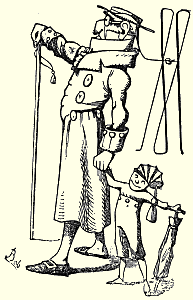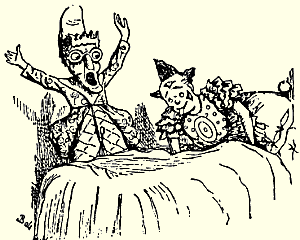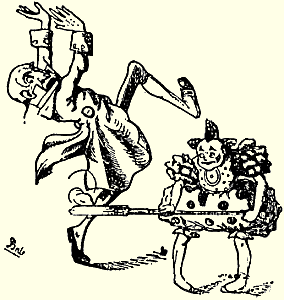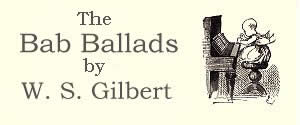 |
y children, once I knew a boy
(His name was Archibald Molloy),
Whose kind papa, one Christmas-time,
Took him to see a pantomime.
He was a mild, delightful boy,
Who hated jokes that caused annoy;
And none who knew him could complain
That Archy ever gave them pain.
But don’t suppose he was a sad,
or serious, solemn kind of lad;
Indeed, he was a cheerful son,
Renowned for mild, respectful fun.
But, oh, it was a rueful day
When he was taken to the play;
The Christmas pantomime that night
Destroyed his gentle nature quite;
And as they walked along the road
That led to his papa’s abode,
As on they trudged through muck and mire,
He said, “Papa, if you desire
My fondest hopes and joys to crown,
Allow me to become a clown!”
I will not here attempt to show
The bitter agony and woe,
The sorrow and depression dire
of Archy’s old and feeble sire.
“Oh, Archibald,” said he, “my boy,
My darling Archibald Molloy!
Attention for one moment lend —
You cannot seriously intend
To spend a roving life in town,
As vulgar, base, dishonest clown,
And leave your father in the lurch,
Who always meant you for the Church,
And nightly dreams he sees his boy
The Reverend Archibald Molloy?”
That night as Archy lay awake,
Thinking of all he’d break and take,
If he but had his heart’s desire,
The room seemed filled with crimson fire;
The wall expanded by degrees,
Disclosing shells and golden trees,
Revolving round, and round, and round;
Red coral strewn upon the ground;
And on the trees, in tasty green,
The loveliest fairies ever seen;
But one more fair than all the rest
Came from a lovely golden nest,
And said to the astonished boy,
“Oh, Master Archibald Molloy,
I know the object of your heart—
To-morrow morning you shall start
Upon your rambles through the town
As merry, mischief-making clown!“
|
 |
* * * * *
Next
day, when Nurse Amelia called,
To wash and dress her Archibald,
She opened both her aged eyes,
With unmistakable surprise,
To find that Archy, in the night,
Had turned all red, and blue, and white,
Of healthy colour not a trace —
Red patches on his little face,
Black horsehair wig, round rolling eyes,
Short trousers of prodigious size,
White legs and arms, with spots of blue,
And spots upon his body too!-
Said she, “Why, what is this, my boy?
My gentle Archibald Molloy!
Your good papa I’ll go and tell,
You must be dreadfully unwell,
Although I know of no disease
With any symptoms such as these.”
The good old lady turned to go
And fetch his good papa, when lo!
With irresistible attack
He jumped upon her aged back,
Pulled off the poor old lady’s front,
And thrashed her, while she tried to grunt,
“Oh, Archibald, what have you done?
|
 |
Is this your mild, respectful fun,
You bad, ungentlemanly boy?
Fie on you, Archibald Molloy!“
Some dreadful power unseen, but near,
Still urged him on his wild career,
And made him burn, and steal, and kill,
Against his gentlemanly will.
The change had really turned his brain;
He boiled his little sister Jane;
He painted blue his aged mother;
Sat down upon his little brother;
Tripped up his cousins with his hoop;
Put pussy in his father’s soup;
Placed beetles in his uncle’s shoe;
Cut a policeman right in two;
Spread devastation round, — and, ah,
He red-hot pokered his papa!
Be sure, this highly reckless course
Brought Archibald sincere remorse.
He liked a joke, and loved a laugh,
But was too well-behaved by half —
With too much justice and good sense —
To laugh at other folks’ expense.
The gentle boy could never sleep,
But used to lie awake and weep,
To think of all the ill he’d done.
“Is this,” said he, “respectful fun?
Oh, fairy, fairy, I would fain
That you should change me back again;
Some dreadful power I can’t resist
Directs my once respectful fist;
Change, and I’ll never once complain,
Or wish to be a clown again!”
He spoke, and lo! the wretched boy
Once more was Archibald Molloy;
He gave a wild, delighted scream,
And woke — for, lo, it was a dream! |



